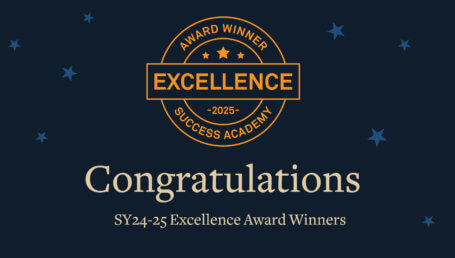
Success Academy tenth-grader Sekou Cisse loves a good argument. A seasoned member of the SA High School of the Liberal Arts debate team, Sekou joined debate as a seventh grader at Success Academy Harlem West.
Sekou recently returned from a weekend in Washington, D.C., where he competed in the Capitol Beltway Classic held at Walt Whitman High School. When the final points were tallied, Sekou was the tenth overall speaker in the tournament—just half a point shy from the top five, and the only student in his event to advance to the elimination round who was not a senior.
Sekou spends many weekends in debate competitions, but also being a mentor to the next generation of Success Academy debaters. Along with his fellow high school debaters, he has attended middle school debate tournaments and practice sessions to offer words of wisdom and encouragement to SA scholars attempting to master the art of argument.
We caught up with Sekou after he took the PSAT to learn more about the debate in D.C., the lessons he’s passing on to our middle school scholars, and how debate will help him achieve his life goals.
Tell me about the format of the debate in D.C.
I participated in the Lincoln-Douglas style of debate, which means you compete as an individual against one other person, while a judge evaluates the arguments. My classmates competed in public forum debate, which means they competed in pairs against other teams. Lincoln-Douglas debate is faster-paced, and you need to gather and explain a lot of evidence. In public forum, it’s more about your persuasive speaking skills — you get the topic further in advance, and it’s slightly slower-paced. There were people there from all across the country—California, New Jersey, New York City, everywhere.
What topics did you debate? Which one was your favorite?
Our school’s public forum team got to debate whether the U.S. government should offer reparations to African-Americans. But my favorite debate in my event was about whether or not minors should be allowed to make autonomous medical decisions. I got to argue against that resolution. I really like being able to argue against resolutions rather than for them; it’s usually more interesting. I argued that youth should not be able to make their own decisions because they might make decisions that hurt them, or that aren’t in their best interest.
You and your teammates have been helping out Success Academy’s middle school debaters. What kind of advice have you been giving them?
This year, we went to one of the middle school debate tournaments to help out. We told them that it’s really important to take it slow, and really weigh your arguments carefully. A lot of middle school debaters get up and say a whole lot of nothing, so you have to really know your arguments to be able to respond to your opponents’ claims.
We also encourage them to work hard. You can be the most brilliant speaker in the country, but if you don’t have the work ethic, or you aren’t willing to go the extra mile to really convince judges that your argument is the correct argument, it won’t help you. You need to do the work.
How do you think learning debate will help prepare you for the future?
When I’m older, I want to be a justice on the Supreme Court. I think debate is a great avenue for me to take, because it helps me learn to think on my feet, and how to craft arguments in a way that’s concise and persuasive.
Corinne Adams, communications assistant at Success Academy, conducted the interview.










